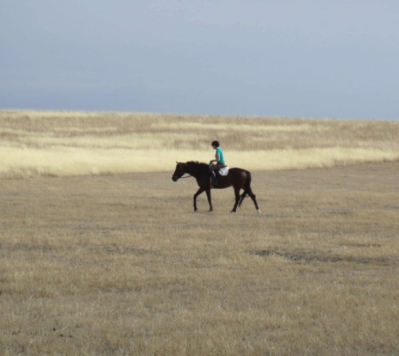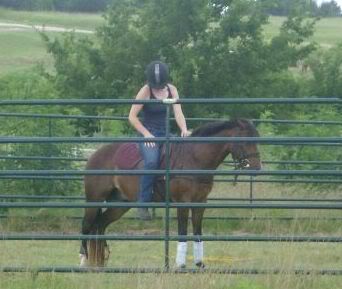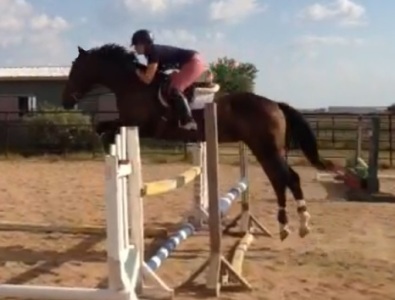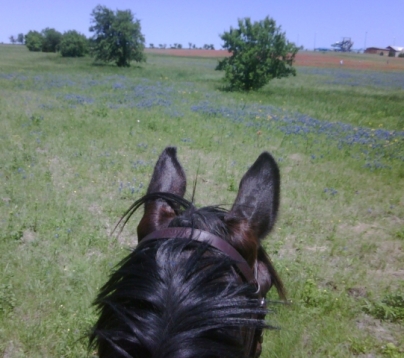I mentioned a couple weeks ago how much I was enjoying reading through the trainwreck of comments on an Eventing Nation post on facebook that featured some 4 year old event horses for sale. I said I would circle back eventually to give my thoughts on the whole thing, so ta-da here we go. It seems I’m not the only one who’s attention was captured by this debate though, as a string of posts on the subject have now appeared on COTH in the past few weeks. I thought that Sarah Lorenz and Lauren Sprieser, who both have extensive experience with young horses, both wrote intelligent, well thought out posts on the subject.

In the comments section of the original facebook post, there were a wide range of different opinions. Some people thought you shouldn’t sit a horse at all until it was 5 or 6, or jump any fences at all until the horse was completely done growing at age 7 or 8. Others had no issue with riding 2yo’s and jumping courses on 3yo’s. Most people probably fall somewhere in between those two extremes, and I think if nothing else we can all agree on one thing: all horses are different. What is the right path for one is not the right path for another.
I think we can also probably all agree that there are a lot of different factors that go into deciding when to start a horse, and how to get it going over fences and in a show career. Some mentally need more work, where others can’t handle it. Some need more time to grow into gangly bodies, where others are already more mature. I think that’s the biggest part of being a good baby raiser and young horse starter – being able to set your own ego and preconceived notions aside and recognize what the horse really needs.

Your opinions on this subject may start out as a personal feeling, or something you read, or something you were told, but over time they tend to become molded more by your own personal experiences. I’ve spent the majority of my life as an equestrian raising or riding young horses. I’ve been the first person to swing a leg over 7 of them, and I’ve owned or worked for a lengthy amount of time with about a dozen horses that were just starting their careers over fences. I’m not saying that to try to prove that I’m right or that I know something, because in the grand scheme of things that isn’t very many horses at all. I’m throwing that out there only to tell you that the one thing I know for sure about that group is that not a single one of them was the same, or followed the same timeline, or needed the same things.

Those horses and my own personal experiences have shaped my feelings on the subject a lot. Most of it, I’m pretty flexible about. On other things, I have developed pretty strong personal beliefs. Most times I hesitate to even say these things out loud (much less put them to paper), because I understand 100% that there is no such thing as a hard and fast rule, that there will always be exceptions, and that my opinions are just that: mine. But, for better or worse, here are my personal philosophies.
- I think that the best time to back a sporthorse for the first time is late 2yo or early 3yo year. For some this may entail taking a few months to put on a basic w/t/c, for others this may just be a handful of rides mostly at the walk, learning to steer. After that they get some time off to let the lessons soak in and keep developing. But I do like to get the job/idea imprinted in their mind relatively early, before they’ve developed strong feelings about a life of leisure, and before they’re ungodly huge. I don’t think it’s a coincidence that the two horses I’ve had with the worst work ethic, and the only ones I’ve ever had plant their feet and refuse to participate, are the two that weren’t started under saddle until they were 4/5.
- I think that before a horse can start “serious” under saddle work, it needs to spend a lot of time hacking out and developing the proper muscles to support a rider, learning to go forward and move their bodies freely over varied terrain or footing. I think that’s especially important with a horse that’s still growing. Too many are just thrown into work without being properly conditioned, mentally or physically, and they end up sour and/or sore.
- I agree with Lauren’s general approach of “3yo’s work 3 days a week, 4yo’s work 4 days a week, 5yo’s work 5 days a week”, and I also agree with her that there are certainly exceptions to this.
- I don’t have a problem with a horse hopping over a few small fences under saddle at 3, although IMO “real” jump training shouldn’t begin until the 4yo year, after the growth plates in the hocks are closed. How much jump training I do in the 4yo year depends on the mental and physical development of the horse. I prefer to start jump training using mostly small grids so they learn where to put their feet and how to use their body correctly, right from the beginning. For some horses that might mean a few weeks of grids, for other horses it might mean a few months.
- I think that quality vs quantity of the horse’s training MUST be taken into account. When you put really good quality work and riding into the horse, the quantity of work and the amount of riding it takes to get them to a certain level comes down. A good young horse trainer can get a horse ready for Novice with less than half the amount of jumping than someone who is less skilled.
- I think that the standard of care to which the horse is kept is what matters most when it comes to long term soundness. Good farrier work, good footing, appropriate conditioning, excellent feed, lots of turnout, and proper care on a day to day basis – those things are IMO by far the biggest factors when it comes to longevity.
The caveat to all of these is to repeat: these are my personal preferences, for my own horses, based on my own experiences. It’s okay if you don’t prefer it for your own.

We do know for sure, proven via several studies, that gentle “stress” on a horse’s hard and soft tissues when they’re still developing is proven to help make them stronger as adults. Just like humans, early conditioning (not overuse – there’s a difference!) tends to make stronger adult athletes. For some horses, they might be able to get that kind of conditioning in a pasture. But unless you’ve got a hell of a lot of varied terrain and footing, and the horses are traveling pretty far distances on their own every day, at all gaits, most sure won’t. At that point it’s up to us to help develop the horse correctly, while being careful not putting an excessive amount of wear and tear on them.
I also don’t have a problem with the young horse classes. They are NOT for every horse, for sure. If you have one that is going to be pretty maxed out at 1*, it’s very unlikely to be running that level as a 6yo unless you’ve pushed it a lot, and it’s body would be stretched to it’s limits. If you have one that is very slow to mature, or one that will require a lot more work to get going, the 4yo YEH series is probably going to be too much. On the other hand, if you have one that is a baby genius and can hop confidently and easily around Novice after just a couple of XC schools (and is clearly headed for the upper levels), that’s the horse for YEH. This is where horsemanship and personal responsibility come into play, and knowing what’s right for your horse. Just because a class exists doesn’t mean they have to enter it.
![Didi 1[1]](https://breedrideevent.com/wp-content/uploads/2019/01/didi-11.jpg?w=395&h=321)
Of course, we have to admit that most of us are not exceptional riders. Michael Jung or Doug Payne or Ingrid Klimke are guaranteed to bring a young horse up the levels more quickly and with far less wear and tear than I would. We also have to ask what becomes of the horses who disappear from the radar after the young horse classes. I spent a lot of time looking at horses from our own YEH series from years past and found the vast majority of them carrying amateurs and young riders around the lower levels, or even some in the h/j/equitation rings. Of course, there are the ones that succumb to bad luck, as horses love to do, or the ones that don’t hold up to the mental or physical stress. From my research, they are a small minority.

I’ve had horses that were 4yo and could canter around a 3′ course with a lead change after just a couple months. I’ve also had those that took a year to be able to do a course at 2’6″ with the same training schedule. So I’m careful not to jump to conclusions when I see a 4yo doing Novice. I’d want to know more about the horse’s history, who’s riding it, what it’s day to day schedule looks like, and how it’s kept. In my opinion those things matter a lot more. Are there people out there pushing horses to do more than they’re ready for? Definitely. 100%. Absolutely. Across every discipline and every age, it happens. It’s terrible and it’s sad. But what is “pushing” for one is not pushing for another, nor is it limited to a certain age group. I think it’s just as bad to see a 10yo being run into the ground and used up. I also think it’s more detrimental to wait until the horse is older to start it and then skip through the slow conditioning work, or rush it up the levels, than it is to start them younger and do it more methodically.
At the end of the day, I just don’t think that the idea of when to start a horse under saddle or over fences is a black and white issue, with hard and fast rules. Many roads lead to Rome. But I do think that it’s important to know more about a situation before making an assessment, either way. No matter where you stand on the issue, we can probably all agree that horses in general are better off when we listen to them and adjust our expectations accordingly, whatever that may look like.

I certainly don’t have much experience at all with young horses, but I do believe strongly that each horse is different and requires a different approach. But then again, I believe that about ALL horses regardless of age. There is no “one size fits all.” I really like your point about checking your ego and doing what’s right for each horse and allowing the timeline to change! It’s good advice for all of us.
LikeLiked by 1 person
So true, every single horse is different and what’s best for one isn’t best for the next! That’s part of why this sport is so difficult.
LikeLiked by 2 people
I agree 100%. I put the first rides on my Appendix QH in April of his 2yo year. I showed him in walk/trot/canter classes a few times that summer. He got the winter off. He went into reining training the spring of his 3yo year. He retired at 24 after a career in reining, ranching/working cattle, showing in all around stock horse shows and finally doing some small h/j shows and as a staff horse for foxhunting. He was never lame until he was 24, and that is most likely soft tissue deterioration from a very long and, at times, strenuous career.
I started my TB the fall of his 3yo year bc he had a BABY brain. He started over small fences almost immediately. I don’t feel like he was an adult horse mentally until he was 10. He’s been sound, too. Well, other than making stupid choices during turnout.
I started my WB mare the spring of her 4yo year. Mostly bc I bred her when she was 3 and the foal didn’t survive, but I would have waited with her regardless. She had some developmental issues when she was young so I wanted to give her every chance to be done growing before working her very hard. She didn’t jump anything until she was 5.
They are all so very different!
LikeLike
That’s the mark of a good horseman!
LikeLike
That point about quality of work over quantity is so huge, and I think is the cause for a lot of differences in opinions. In a lot of the comments on that post it looked like many people don’t realize that very conscientious quality training can get a horse to a certain level with much much less stress (physically and mentally) than a less talented trainer. And since there are many more less-talented trainers than there are truly talented ones, there’s a perception that it takes a pounding to get a horse to a certain level. Funny how good horsemanship always tends to boil down to doing what’s best for that horse in particular at that time. Seems so simple.
LikeLike
Totally agree with you, I think quality of riding/training is a factor that many people don’t take into consideration when they look at how quickly some of the talented pros are able to move horses up the levels. They can do it with a heck of a lot less pounding than I could!
LikeLike
I agree that all horses are individuals and should be treated as such, but I do worry that have high-dollar classes for young horses does encourage people to push youngin’s beyond their abilities. Granted, my experience has been more with western horses, living out in the Midwest. But I have seen 4 year olds with severe hock arthritis because they were in full reining or barrel training at two, because their owners wanted to enter them in futurities. So it is a balancing act, but I don’t feel like we need to add incentives for people to push babies before they’re ready.
LikeLike
Nice post. I really hate when these super grey areas get people with really strict rules of thumb. My only experience with horse breaking has been with racing Thoroughbreds, and they get started REAL young. Some of them are fine and even do well with this, while others could use more time. I’ve seen a lot of horses ruined because they started too late or sat for too long, and yeah okay their joints are in brilliant condition but their minds are totally sour.
Like almost any other horse topic, there are no absolutes just a constant endeavor to find the right middle path for each horse!
LikeLike
While most TB’s are definitely started earlier than I would prefer, one perk about the thoroughbreds being started young is that they’re programmed to want to work from an early age, and they know how to go forward. Granted, both of those things can be messed up later on down the road, but when they’re started well, and then developed well, those are traits that really help see them through to future careers.
LikeLike
To build on this, I see a lot of thoroughbreds that tend to take a beating over their careers and LAST. It’s weird, but I see more gently started horses than “hard used and started young” racehorses with soft tissue injuries that stall their careers. Both types end up with arthritis. I’d rather the horse with a history of fitness and USE than one that has only sat. It’s harder to condition the one who has sat, mentally and physically.
LikeLike
+1 to both of the above. You cant beat the work ethic of a TB, imo, and there are war horses that are absolutely killing it in second careers even after racking up 50+ starts. It’s impressive.
LikeLike
I agree with this too.
LikeLike
All I can say is young horses will keep you humble. You can take a young horse well prepared to a schooling show and hav it refuse to jump, or jump the ground pole like it is 3 foot. Just support the horse and move on. They can only learn as fast as they comprehend. Love them anyway. Tomorrow is another day and another try.
LikeLike
100% agree with you on everything above. I started Hampton late in his 2 year old year. I wanted to be sure he knew basic aids, steering, manners because I had a feeling he was going to start getting really big (he did). I’m really glad I did. It installed a good work ethic in him and I didn’t have to start a monstrous 3 or 4 year old.
LikeLike
👏👏👏 Very well written. I agree wholeheartedly. My personal experiences – so far – are completely in tune with yours.
Thanks for sharing your experiences.
LikeLike
Yep, agree. All of it. I think I’m all done with young horses as I’ve proven to not get the job done very well on my last attempts. But I’ve had a fair amount of experience, and am in line with your thoughts here. Hopefully my next horse, ideally around seven or eight, is brought up this way!
LikeLike
Hey Amanda! Have you reflected lately on the tremendous jump your writing has taken? Girl, I want to be seeing your name in print. You have really developed your writer’s voice this year. Please keep being you. I’m a western horsemanship rider who hasn’t jumped anything higher than a ground pole in years and I am utterly captivated by your blog. Please tell me you are getting paid for your writing in print somewhere. You have great talent that could convert to show dollars (as you mentioned your side hustles last post).
LikeLike
I have to agree. The worst thing you can do for a horse, in my opinion, is not give a horse a job. No one wants your unbroke 6 year old or your 10 year old prospect who can barely steer. By giving them so much ‘time to grow’ you cheat them out of a career. And we know what happens to horses with no job.
LikeLike
I’ve never started my own horse from the ground up, but your perspective sounds really reasonable and what I would do if I was in that position. I think what you are doing with Presto is fabulous and will save a lot of trouble further down the road!
LikeLike